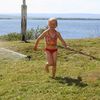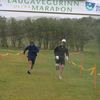By Adrian Brune
Chicago Tribune
(MCT)
CHICAGO - On a crisp fall morning 16 years ago, Bob Sarocka, then 27, crawled out of bed with a mild hangover and a pang of regret as he laced up his sneakers and set out for a run along the Illinois Prairie Path in Lombard, trying to remember the conversation that led up to this moment when foot hit pavement and breath condensed in morning air.
Then it came to him: It was a talk with a friend of his future sister-in-law, the one raising money for breast cancer, who picked up on his alcohol-induced vulnerability the previous night and seized the moment to persuade him to run a 5-kilometer race in a few weeks.
Though not a natural runner, Sarocka kept his pledge, trained for the event and, to his surprise, enjoyed the race and experienced a "runner's high." So, with celebratory beer in hand, he made another potentially regrettable pact-to run the Chicago Marathon the following fall. That race wasn't so pleasant.
"I didn't clue in to the fact that, hey, you might need to run 20 miles to practice before you run 26, and I was in serious pain," Sarocka says. "I swore I'd never do it again. ... Then I signed up for the Lake County Marathon."
It didn't prove any more enjoyable for the Motorola engineer, but a former girlfriend's brother introduced him to the Chicago Area Runner's Association, and Sarocka found his groove. "I hooked up with them, trained on the lakefront, signed up for the Chicago Marathon again and it went a lot better."
So well, in fact, that he signed up for the Chicago event the next year, then another one Downstate, then another in Wisconsin, and another in Minnesota. By the age of 32, he was up to eight. In the 16 years since that first training run, Sarocka has done 79 marathons covering all 50 states. He has also entered the gotta-be-crazy realm of ultramarathons, running two 50-milers to qualify for an even longer, 100-mile race.
At the LaSalle Bank Chicago marathon in 1996, his performance earned him what he calls his "nomination for running idiot": going 23 miles on a broken ankle.
If that sounds wildly excessive, consider that Sarocka's schedule is quite modest compared to that of thousands of other extreme marathoners out there, some of whom enter dozens of endurance events each year.
Who are these freaks? They certainly don't fit the usual image of long-distance runners, with their body-fat ratio in the low single digits. Many of them, in fact, look like standard American couch potatoes.
They're people like Bob Lehew, an engineer from Tulsa, Okla., who has run 148 marathons and ultra-marathons and who founded the Oklahoma Marathon nine years ago. They're ageless wonders like Don McNelly, an 85-year-old who has finished 707 marathons, 138 of them since his 80th birthday.
And they are the Type-A's like Susan Daley, a corporate attorney who will run the Chicago marathon again this year, then hop on a plane for Washington, D.C., a week later to do the Marine Corps marathon. She has completed more than 300 marathons covering all 50 states and all seven continents, flying to places such as Cape Town, South Africa, and Australia for two or three days just to run in one.
"It's something totally different from what I'm doing during the week - an escape," Daley says.
The ancient Greeks are credited with the marathon's origins. Pheidippides, the Athenian herald, ran 21 miles to Athens to announce the Greek victory over Persia in the Battle of Marathon. Then he collapsed and died.
Despite that inauspicious beginning, the marathon eventually captured the imagination of athletes around the world, becoming an Olympic event and inspiring legions of people to try to match Pheidippides' feat. (The current marathon distance of 26.2 miles was set in the 1908 London Olympics, so the course could start at Windsor Castle and end in front of the Royal Box.)
But the phenomenon of serial marathon and ultramarathon runners boggles the minds of sports psychologists, physiologists and even those of us who have run a marathon and could barely walk for a week afterward. Many people regularly exercise, but at what point does working out become a life-altering obsession?
"Obsession? Yes, flying to Sydney to run a marathon over the weekend is an obsession," says Dave Martin, an exercise physiologist and chairman of the marathon development committee at USA Track and Field, the sport's governing body. "The question is whether the obsession is good or bad. If it causes trouble with your marriage, interferes with work or creates bankruptcy, it's clearly not good. If you train properly, it could actually be healthy."
But what about people for whom 500 marathons aren't enough? Because extreme marathon running is a relatively recent pastime, researchers haven't fully delved into the minds of those who do it, and they can offer only educated guesses about their motivation.
"There's a runner's high that can be explained physiologically, but that doesn't come with every marathon," Martin says. "This type of runner is not young," he adds. "Many times, they have a friend who experienced a major health crisis or (they) experienced one themselves and decided to start running for health, or for a cause.
"But a lot of it is social too. Running is something you do aerobically-you can talk when you run. ... Lots of people come, food is provided, and there's a big party after."
He notes, however, that some marathoners are what psychologists call niche-seekers. "They're motivated, goal-oriented people. They can't physically be the best at something, so they set a goal to stand out in something else, and when they achieve that, they have to set another."
Don McNelly and running buddy Norm Frank are examples of marathoners who started running for health reasons and continued for the socialization and-at their age-the notoriety. McNelly is aiming for marathon number 800 by 2009. Frank hopes to top his current 925 - the most in North America - and eventually reach 1,000 marathons.
"I've run the most marathons after the age of 70, 80 and 85," says McNelly, who now speed-walks his races. He didn't begin running with any of this in mind. In the late 1960s a close friend died suddenly of a heart attack. "Boom, he was just dead," McNelly says. "So I went to my doctor and he gave me (a) book on aerobics and told me to get in shape."
One of the things fueling the long-distance runners are marathon clubs in all 50 states, on all seven continents and in some of the most remote places in the world. A former school superintendent from Illinois, Dean Rademaker, started the original club, whose 850 members set out to run a marathon in each of the 50 states. The Second 50 States Club, a rival to Rademaker's group, has 1,150 members.
One of them is Daley, the Chicago lawyer with an endless enthusiasm for running and a tendency to finish dead last at many of marathons she enters - two a month. The events have become a dominant factor in her life, a form of identity. "It's like most people at the office ask about other people's kids; people ask me about how my marathons went," she says. "Everyone has some sort of obsession."
Daley began running about 16 years ago at age 31 after watching a friend finish the Chicago marathon. "It looked as if it would be something fun to do," she says. A year later, she finished her first Chicago marathon in her best time: 4 hours, 18 minutes. Since then, her work schedule has left little time to train, but she has managed to finish marathons on all seven continents, including one on China's Great Wall and in Antarctica.
"I get to travel to great places and connect with the locals," she says. "The people in different countries all cheer you in their unique ways - the Swiss chant, `Hop hop' to cheer you on, the French have tea, wine and raisins at the aid stations."
While many researchers believe long-distance running can be a good thing, diminishing stress, raising heart rates and reducing hardening of the arteries, some doctors might label two marathons a month not only excessive, but harmful. Dr. William Glasser in 1976 studied long-distance runners and found that they persisted because they had become "addicted." Such people, he discovered, run whether their bodies are healthy or not, which results in chronic injuries that are slow to heal.
Daley's friend Layne Reibe might fall into this category. She got hooked on the high of crossing the finishing line in her first marathon. At marathon number 237 last January, she slipped and fractured her foot with 13 miles to go.
"It hurt, but I could walk, so I hobbled along and finished the race," Reibe says. "It wasn't till the next morning when the foot was swollen twice its size and I couldn't put any weight on it that I realized something was wrong."
In April, Reibe's doctor gave her the OK to start walking races, and since then she has walked five 50Ks and four marathons wearing a special boot. Her foot still hasn't healed. "The doctor says I would probably have to stay off the foot completely for 30 days for it to happen," she says. "And that is not possible. ... So it will heal, I guess, when it will heal."
Other signs of addiction include fatigue, decreased ability to concentrate, an overemphasis on the quantity of miles and skipping appointments and family obligations. Experts on eating disorders also note that some long-distance runners - along with a small percentage of other endurance athletes - suffer from a condition known as exercise bulimia: They run compulsively to purge calories from overeating, just as other bulimics take laxatives or induce vomiting after meals.
---
After a 12-mile run one recent Sunday, 10 members of the Glen Ellyn Runner's Association, including founder Sarocka, talked about the psychological benefits of their intense marathon running over coffee and bagels.
"I'm insufferable; you can't be around me unless I run four times a week," says Sally Martin, a family-law attorney who is now on marathon number 15. "My wife says I'm impossible to live with if I don't run," Sarocka echoes.
Though multiple marathoners admit that non-runners might see their activity as excessive - and Martin acknowledges it contributed to a divorce in her group - Martin and friend Beth Campbell, whom she met through the Glen Ellyn club, extol the bonds they form through running. "Talking to these people while running is like therapy," Martin says. "One marriage might have ended over the running, but we've saved marriages. We've helped people through remodeling their kitchens. We've listened to and given advice on dating."
"I'll do it until I absolutely can't," says Daley, who has scheduled marathons in Florence, Honolulu, St. Croix and maybe Tokyo for the near future. Sarocka feels the same.
"Some people run just to get another notch in their belts, and that's their thing," Sarocka says. "I just enjoy it; it's a great stress reliever and some of these people are better friends than my college buddies. If it weren't for the camaraderie, I wouldn't do it anymore."
Flokkur: Bloggar | 16.10.2006 | 15:38 (breytt kl. 15:41) | Facebook









